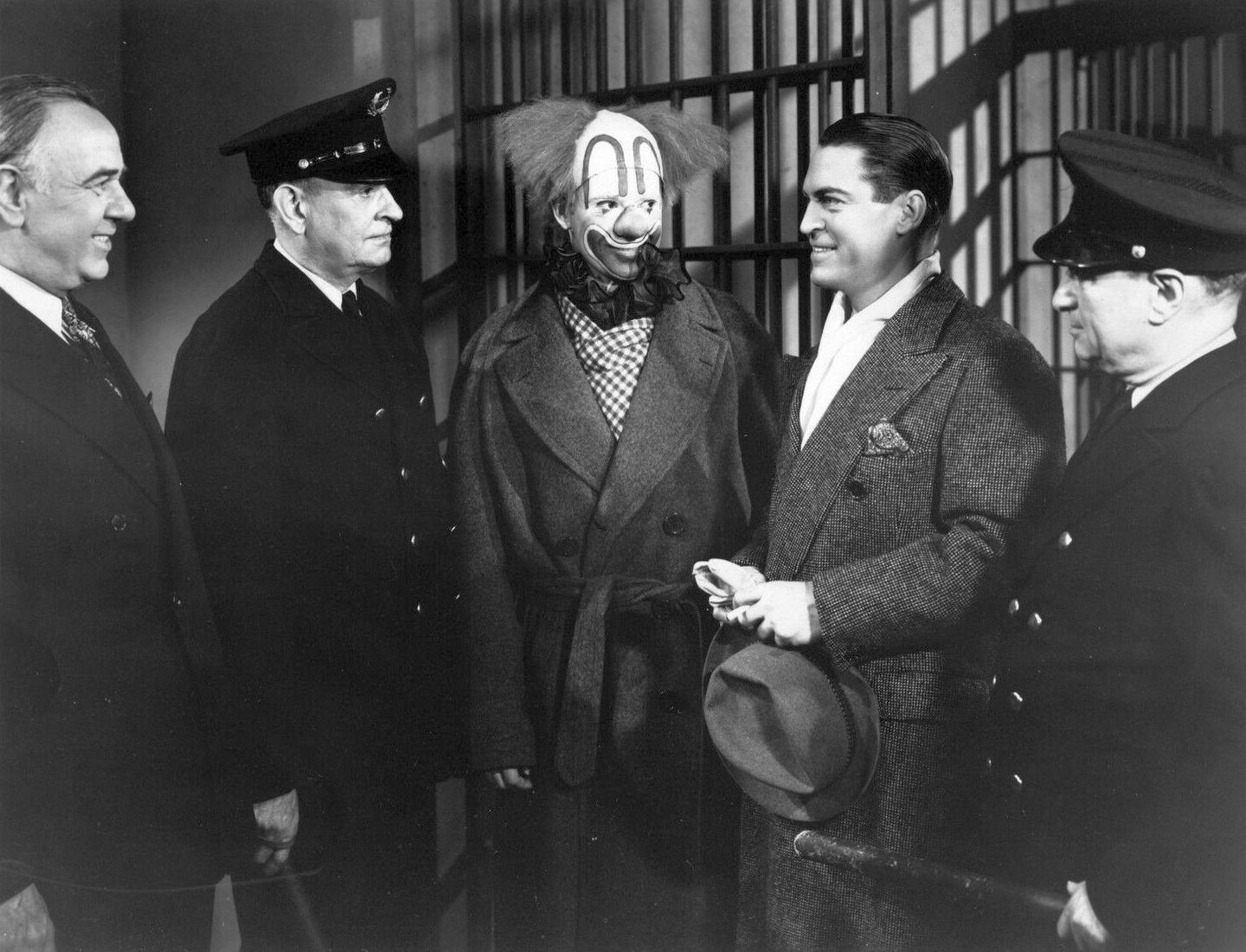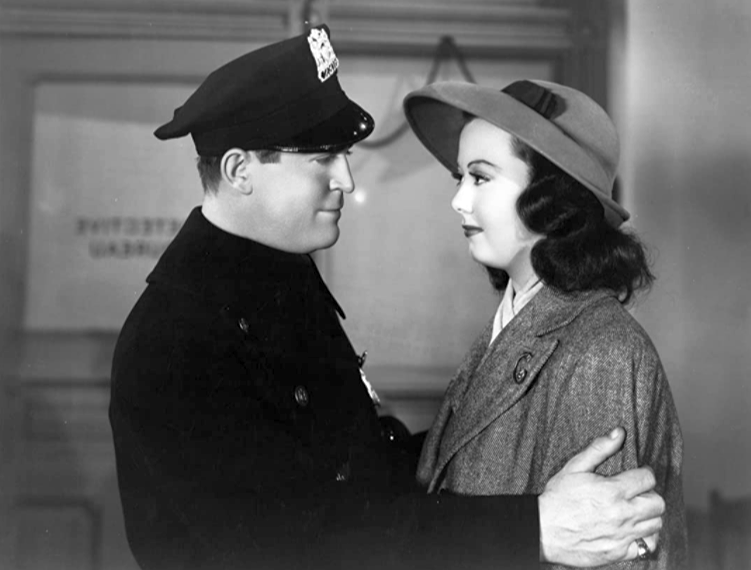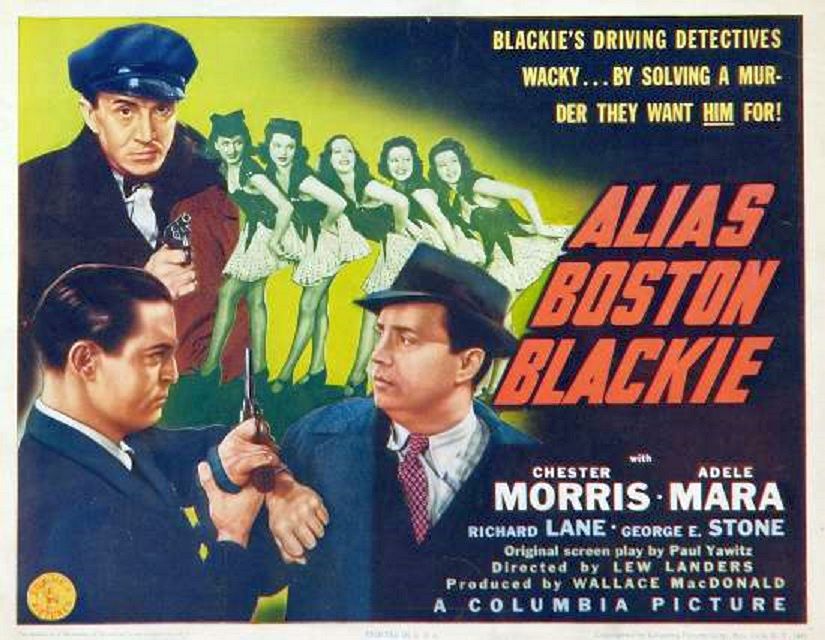Review: Alias Boston Blackie (1942)
Posted by Ivan G. Shreve, Jr. on Mar 14th 2014
It’s Christmas Eve, and reformed safecracker Horatio “Boston Blackie” Black (Chester Morris) has arranged for a vaudeville troupe to entertain the prisoners at his “alma mater” in the spirit of fellowship and good cheer. One of the dancing girls in the company, Eve Sanders (Adele Mara), risks violating the prison rules by coming along. She’s already visited her brother Joe Trilby (Larry Parks) twice that month — he’s a guest of the state for a fifteen-year stretch as a result of his participation in a robbery-murder. Blackie reassures clown Roggi McKay (George McKay) that it’ll be okay for Eve to make the trip, confident that no one will recognize her among all the other showgirls.
On the bus ride up to the prison, Blackie and the performers pick up a pair of hitchhikers—cops Farraday (Richard Lane) and Matthews (Walter Sande), because Farraday is certain that Blackie’s Christmas surprise means that he’s up to something. As usual, Blackie’s past makes him an object of suspicion—but the guilty culprit in this instance is Joe. In the pen for a crime he didn’t commit, he ties up Roggi in a spare room and walks right out the prison gate disguised as the clown. Joe has sworn to get even with the two men who set him up as a patsy, so Blackie and The Runt (George E. Stone) have their hands full trying to stop the elusive fugitive…and stay one step ahead of the always mistrustful Farraday.

Because Alias Boston Blackie (1942) takes place in a twenty-four hour period (Christmas Eve to Christmas night), in recent years it’s often made the rounds among the Yuletide-themed films showcased on Turner Classic Movies in the month of December. The movie was originally released in April of 1942, and even though the proceedings in Alias only tangentially come into contact with the holiday season, that doesn’t keep it from being every bit as pleasurable as the first two entries in Columbia’s Boston Blackie franchise. (There’s some sentimental camaraderie between Blackie and Farraday despite their usual squaring off, and even a lovely Christmas toast at film’s end!)
Chester Morris (Blackie), George E. Stone (Runt), Richard Lane (Farraday) and Walter Sande (Matthews) all reprise their familiar series roles in this third entry, as does Lloyd Corrigan as Blackie’s chum Arthur Manleder (who has a few comic relief bits as he suffers from a mild case of lockjaw)…and in addition, Alias Boston Blackie introduces the character of Jumbo Madigan to the franchise; a pawnshop proprietor who could always be counted upon to provide Blackie with information about individuals with ties to the underworld. Jumbo’s played in this entry by Cy Kendall—a stocky actor known for playing villains in such serials as The Green Hornet (1940) and Secret Agent X-9 (1945)—who would revisit the part in the Blackie vehicle immediately following Alias, Boston Blackie Goes Hollywood (1942), as well as in The Chance of a Lifetime (1943).

Classic movie fans will recognize Larry Parks in the role of Joe. This actor later achieved silver screen fame playing the greatest entertainer of them all, Al Jolson, in both The Jolson Story (1946) and Jolson Sings Again (1949). (Tragically, his movie career would come to an end in the 1950s as a result of the blacklist…despite having borne his soul in front of the House Un-American Activities Committee.) Actress Adele Mara plays Joe’s sister, Eve, and is best known for her roles in B-westerns and two John Wayne classics, Wake of the Red Witch (1948) and Sands of Iwo Jima (1949). You’ll recognize character actor Paul Fix as one of the bad guys. (Fix was Marshal Micah Torrance on TV’s The Rifleman.)And if the gentleman driving the bus looks as if he’d be more comfortable underwater, that’s because it’s Sea Hunt’s own Lloyd Bridges in one of his earliest cinematic outings.
Alias Boston Blackie continues the winning formula of the previous films in Columbia’s franchise as a fast-paced and entertaining programmer that deftly blends suspense and snickers. The screenplay is by Paul Yawitz (who was also responsible for Confessions of Boston Blackie) and is directed at a breakneck pace by Lew Landers, an accomplished B-picture director who always made them move and on budget. The dialogue is snappy, and the situations are suspenseful. In fact, there is an encounter with cops at a police station that might remind viewers of The Silence of the Lambs — honest, it’s not as bizarre as it sounds — that results in a pursuit of Blackie (who is disguised as a uniformed cop), Eve, and The Runt via motorcycle and sidecar.

Next month, Boston Blackie Goes Hollywood (1942)! While it sounds like fame might be going to our hero’s head…he’s really just visiting the film capital to bail out his chum Arthur Manleder. Look for Alias Boston Blackie on a classic movie channel near you…and don’t forget to check out Radio Spirits’ latest CD release featuring the “friend to those who have no friends”—Boston Blackie: Outside the Law.

